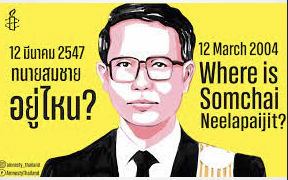Twenty years ago today, I received a phone call in the middle of the night with the news that my friend and colleague, the prominent human rights lawyer Somchai Neelapaijit, had gone missing. At that time, Somchai was chair of Thailand’s Muslim Lawyers Association and vice-chair of the Human Rights Committee of the Lawyers Council of Thailand.
Official investigations established that Somchai was abducted in Bangkok on March 12, 2004, and presumably murdered, though his body has never been found. The alleged assailants were a group of police officers who sought retaliation for Somchai’s involvement in lawsuits regarding widespread police torture of Muslim suspects in Thailand’s insurgency-ridden southern border provinces.
Over the past two decades, eight Thai prime ministers, including current Prime Minister Srettha Thavisin, have failed to bring those responsible for Somchai’s enforced disappearance to justice.
Without Somchai’s body, prosecutors filed charges only for robbery and coercion against the five police officers implicated in the case. That trial, hampered by official cover-ups, ended in their acquittal in December 2015.
Efforts by Somchai’s family to obtain justice have been further obstructed by a 2015 Supreme Court ruling that the family cannot act as a co-plaintiff, because there is no concrete evidence showing Somchai is dead and therefore incapable of bringing the case himself. The ruling placed a Kafkaesque burden on individuals who have been forcibly disappeared to prove their own disappearance before any progress can be made in their case.
International law defines enforced disappearance as the detention of a person by state officials or their agents and a refusal to acknowledge the detention or to reveal the person’s fate or whereabouts. Disappearances are especially painful for the victims’ families.
The United Nations has recorded 76 enforced disappearance cases in Thailand since 1980. None have been resolved, and no one has ever been punished for these crimes, even after Thailand adopted a law in 2022 recognizing enforced disappearance as a criminal offense.
The Srettha government has pledged to ratify the International Convention on Enforced Disappearance, which Thailand signed in 2012. But as we mark 20 years since Somchai’s disappearance, that promise remains unfulfilled.
Another year should not pass without justice for Somchai and the other victims of enforced disappearance. The Thai government needs to deliver justice for them and their families, and for all Thais.
Source:
https://www.hrw.org/news/2024/03/11/thai-lawyer-remains-disappeared-20-years




